Coronavirus: Charities in England ‘on brink’ of collapse as sector faces £4bn funding blackhole
CEO of St John Ambulance warns charity helping NHS covid-19 could run out of money by August

Your support helps us to tell the story
From reproductive rights to climate change to Big Tech, The Independent is on the ground when the story is developing. Whether it's investigating the financials of Elon Musk's pro-Trump PAC or producing our latest documentary, 'The A Word', which shines a light on the American women fighting for reproductive rights, we know how important it is to parse out the facts from the messaging.
At such a critical moment in US history, we need reporters on the ground. Your donation allows us to keep sending journalists to speak to both sides of the story.
The Independent is trusted by Americans across the entire political spectrum. And unlike many other quality news outlets, we choose not to lock Americans out of our reporting and analysis with paywalls. We believe quality journalism should be available to everyone, paid for by those who can afford it.
Your support makes all the difference.Ministers have been warned that some charities in England are “on the brink” and facing imminent collapse due to the impact of coronavirus, with the sector estimated to lose £4 billion in funding.
Due to a drastic decline in fundraising events and the cancellation of major events such as the London marathon, MPs were told some organisations are in “really, really serious trouble” and risk insolvency unless the government acts with urgency to support the sector.
The Commons Digital, Culture, Media and Sport committee also heard that St John Ambulance – a charity helping the NHS’s effort against covid-19 – will run out of money by August unless charities receive a cash injection.
It comes after 240 MPs and peers demanded government funding for charities due to the “absolutely disastrous” situation the organisations are in amid sweeping government restrictions to curb the spread of covid-19.
On Friday, the Cabinet Office minister Michael Gove said the government was looking at a specific fund in order to support charities through the crisis, but no details have yet emerged on the nature or size of the fund, or who might benefit from its support.
Giving evidence at a parliamentary committee, Karl Wilding, the CEO of the National Council for Voluntary Organisations, expressed frustration at the government’s lack of urgency and said the crisis facing the sector far outstripped the financial crash.
“In the crash of 2008 there were some serious risks to our sector – Icelandic banks that held our assets and so on,” he told the DCMS committee. “But the big difference this time is that our income has literally stopped over night.”
Martin Houghton-Brown, the CEO of St John Ambulance, whose organisation is training volunteers to deal with the coronavirus outbreak and aid the effort at the new NHS Nightingale Hospital in east London, told MPs his organisation receives £1.5m a week.
But he added: “The cost of delivering for covid-19 operations is £1.6m per week… We know we need central government, we need the Treasury to step up to support organisations.
“If the support doesn’t come, we will run out of money. With the NHS money that has been deployed so far, we think we can keep going until August. But I have to say we are in a lucky position: we’ve got assets that we can take huge debt finance against.”
Addressing issues facing smaller charities, Mr Houghton-Brown continued: “I know that there are local YMCA’s that are right on the brink – that they have a matter of weeks before they have to declare themselves insolvent.
“I know that there are smaller local charities up and down the country who are genuinely vulnerable and if we don’t move now we will lose them.”
Mr Wilding estimated during his evidence session that in the next quarter, charities in England will generate an income of around £12.5bn, but there will be a loss in the sector “in the region of £4bn”.
“Over the last two decades charities have shifted from a model where were receiving predominately government grants and donations to much more of a mixed-economy, where they trade just like businesses,” he said. “Also just like businesses their trading income essentially has halted.
“Lots of charities fundraise in ways that require people to come together. You will know the London marathon of course, but there are many other smaller, community events and because of the social distancing measures those events have stopped.”
“We find ourselves in a situation where the level of need many organisations are facing is increasing, but the income that organisations generate… that income has stopped.”
On the government’s job retention scheme unveiled by Rishi Sunak, the chancellor, almost two weeks ago, he said the “design does not match the intent” as he claimed a maximum of one in three charities will be able to use the furloughing programme.
“The problem is is that essentially the furloughing the scheme - laying staff off - means you are standing down staff at exactly the time you want them to step up,” he said. “We need to mobilise them.”
Director of engagement at the Motor Neurone Disease Association, Chris Wade, added: "We're a £17 to £18 million charity in terms of income per year and we're expecting to lose anywhere between £3.5 million and £5.5 million over this period and that's on the assumption that we're back to some form of normality in about six months time."
He added that "four to five months' reserves will soon disappear" and the National Emergency Trust appeal which has raised £11m is "certainly not the answer I'd expect from the government as a solution to this".
Join our commenting forum
Join thought-provoking conversations, follow other Independent readers and see their replies
Comments